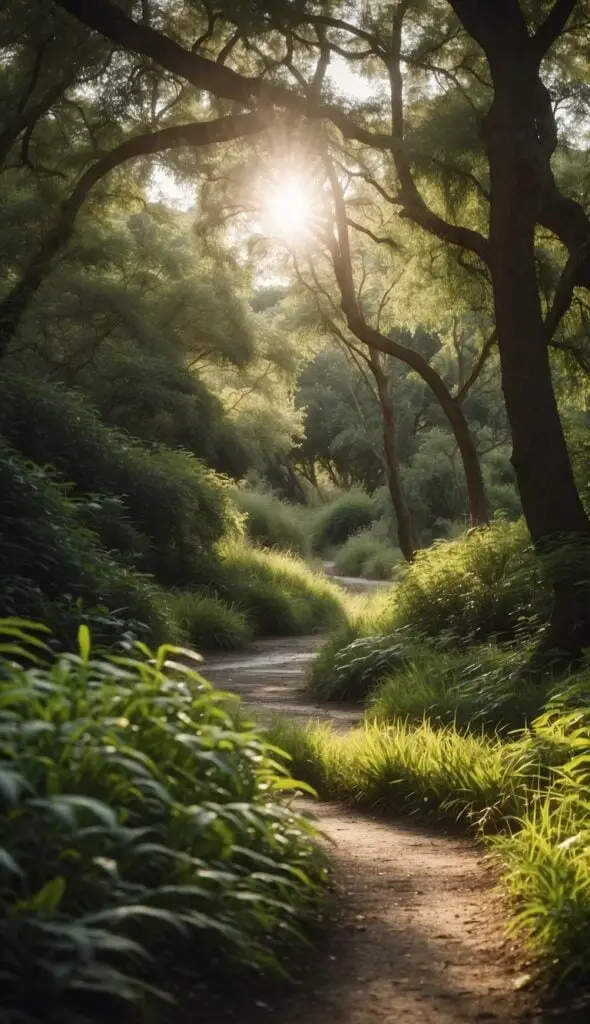Nestled within the leafy embrace of the Roxborough neighborhood in Philadelphia’s northwest district, the Schuylkill Center for Environmental Education beckons visitors to escape the urban bustle and immerse themselves in nature’s embrace. As one of the city’s largest green spaces, spanning over 340 acres, this sanctuary serves as a vital hub for environmental education, conservation efforts, and community engagement.
Adjacent to the center lies the verdant expanse of Wissahickon Valley Park, offering miles of hiking trails, picturesque streams, and shaded groves perfect for outdoor adventures. Just a stone’s throw away, the historic Manayunk neighborhood charms with its quaint streets lined with boutiques, cafes, and the scenic Manayunk Canal Towpath, ideal for leisurely strolls or bike rides.
Further afield, Fairmount Park, one of the largest municipal parks in the country, invites exploration with its sprawling landscapes, historic landmarks, and cultural attractions such as the Philadelphia Museum of Art and the Please Touch Museum. And for those seeking a dose of history, the nearby Valley Forge National Historical Park offers a poignant glimpse into the Revolutionary War era amidst its rolling hills and historic sites.
Amidst this tapestry of natural beauty and cultural heritage, the Schuylkill Center stands as a beacon of environmental stewardship, inspiring visitors to connect with the land, learn about ecological conservation, and become advocates for a sustainable future. Whether you’re a local resident or a traveler passing through, a visit to this urban oasis promises an enriching experience that fosters a deeper appreciation for the wonders of the natural world.
Table of Contents
Overview of the Schuylkill Center
Established in 1965, the Schuylkill Center for Environmental Education stands as a testament to Philadelphia’s commitment to preserving its natural heritage amidst the urban landscape. Located within the Roxborough neighborhood of the city’s northwest district, this expansive sanctuary spans over 340 acres of diverse ecosystems, including woodlands, meadows, and wetlands.
At its core, the Schuylkill Center is dedicated to promoting environmental education, conservation, and community engagement. Through a myriad of programs and initiatives, it serves as a vital resource for individuals of all ages seeking to deepen their understanding of the natural world and cultivate a sense of environmental stewardship.
The center’s educational offerings cater to a wide range of interests and age groups, from guided nature walks and wildlife observation sessions to hands-on workshops and summer camps. These engaging experiences provide visitors with opportunities to explore the interconnectedness of life, foster a deeper appreciation for biodiversity, and learn practical skills for sustainable living.
Beyond its educational mission, the Schuylkill Center plays a crucial role in ecological conservation within the Philadelphia region. Its diverse habitats provide refuge for numerous plant and animal species, contributing to the overall health and resilience of urban ecosystems. Through habitat restoration projects, native plant initiatives, and wildlife monitoring efforts, the center actively works to preserve and enhance the biodiversity of its surroundings.
In essence, the Schuylkill Center for Environmental Education serves as a beacon of hope and inspiration in an increasingly urbanized world. By connecting people with nature, fostering environmental literacy, and promoting conservation action, it empowers individuals to become stewards of the Earth and advocates for a sustainable future. Whether you’re a curious explorer, an aspiring naturalist, or simply seeking solace in nature, a visit to the Schuylkill Center offers a transformative experience that leaves a lasting impression.
Environmental Education Programs
The Schuylkill Center for Environmental Education offers a diverse array of educational programs designed to engage participants of all ages and backgrounds in hands-on learning experiences that foster a deeper connection with the natural world.
For young learners, the center’s preschool programs provide a gentle introduction to environmental concepts through play-based activities, nature walks, and exploration of the center’s diverse habitats. These early experiences lay the foundation for a lifelong appreciation of nature and instill values of environmental stewardship from an early age.
Elementary and middle school students can participate in a variety of programs that combine scientific inquiry with outdoor exploration. From studying the intricacies of ecosystems to learning about local wildlife and conservation practices, these programs encourage curiosity and critical thinking while nurturing a sense of environmental responsibility.
High school students and adults have the opportunity to delve deeper into environmental topics through workshops, lectures, and field-based experiences led by knowledgeable experts in their respective fields. Whether it’s learning about sustainable gardening practices, wildlife tracking techniques, or the principles of ecological restoration, participants gain practical skills and valuable insights that empower them to make informed decisions in their own lives and communities.
In addition to its regular programming, the Schuylkill Center offers special events, such as guided nature walks, seasonal festivals, and citizen science projects, which provide opportunities for individuals and families to connect with nature in fun and meaningful ways. These events not only educate participants about environmental issues but also inspire them to take action to protect and preserve the natural world.
Overall, the environmental education programs at the Schuylkill Center are designed to inspire curiosity, cultivate empathy, and empower individuals to become active stewards of the environment. By providing engaging and accessible learning experiences, the center plays a crucial role in fostering a deeper understanding of ecological systems and promoting sustainable practices that benefit both people and the planet.
Ecological Significance
The Schuylkill Center for Environmental Education holds profound ecological significance within the urban landscape of Philadelphia. Spanning over 340 acres of diverse habitats, from woodlands to meadows and wetlands, this sanctuary serves as a vital refuge for native flora and fauna in an otherwise heavily urbanized environment.
One of the key ecological roles of the Schuylkill Center is its contribution to biodiversity conservation. Its varied ecosystems provide crucial habitat for a wide range of plant and animal species, including migratory birds, pollinators, and amphibians. By preserving and enhancing these habitats, the center helps to maintain healthy populations of native wildlife and promote ecological resilience in the face of environmental challenges.
In addition to supporting biodiversity, the Schuylkill Center plays an important role in ecosystem services provision. The wetlands within the center help to regulate water flow, filter pollutants, and mitigate flooding, while the woodlands sequester carbon, improve air quality, and provide valuable green spaces for recreation and relaxation. These ecosystem services not only benefit the local environment but also contribute to the overall health and well-being of surrounding communities.
Furthermore, the Schuylkill Center serves as a living laboratory for ecological research and monitoring. Through partnerships with academic institutions, government agencies, and citizen science initiatives, researchers are able to study ecological processes, track changes in biodiversity, and assess the effectiveness of conservation strategies. The knowledge gained from these research efforts not only informs management decisions within the center but also contributes to broader efforts to protect and restore ecosystems regionally and globally.
Overall, the ecological significance of the Schuylkill Center extends far beyond its boundaries, serving as a beacon of hope for urban conservation and a model for sustainable land management practices. By preserving diverse habitats, supporting native species, and promoting ecological research and education, the center embodies the vital role that urban green spaces play in creating a healthier, more resilient planet for future generations.
Community Engagement
Community engagement lies at the heart of the Schuylkill Center for Environmental Education’s mission, fostering connections between people and nature while empowering individuals to become active participants in environmental stewardship.
Through a diverse range of programs and initiatives, the center cultivates a sense of belonging and ownership among local residents, inviting them to explore, learn, and take action to protect their natural surroundings. Volunteer opportunities abound, from trail maintenance and habitat restoration projects to citizen science initiatives that allow community members to contribute valuable data to ongoing research efforts.
In addition to hands-on volunteer opportunities, the Schuylkill Center offers a variety of educational programs and events designed to engage people of all ages and backgrounds. From guided nature walks and wildlife observation sessions to workshops on sustainable gardening and urban ecology, these programs provide accessible and inclusive learning experiences that inspire curiosity and foster a deeper appreciation for the natural world.
The center also serves as a hub for community gatherings and cultural events, hosting seasonal festivals, art exhibitions, and performances that celebrate the intersection of nature and culture. These events provide opportunities for people to come together, connect with like-minded individuals, and share their passion for the environment in a supportive and welcoming atmosphere.
Furthermore, the Schuylkill Center actively collaborates with local schools, community organizations, and government agencies to address environmental challenges and promote positive change at the neighborhood level. Through partnerships and outreach efforts, the center strives to build bridges between diverse stakeholders, facilitate dialogue, and advocate for policies and practices that promote environmental sustainability and social equity.
In essence, community engagement is woven into the fabric of the Schuylkill Center’s work, shaping its programs, initiatives, and partnerships in ways that empower individuals and communities to become agents of positive change in their own lives and neighborhoods. By fostering connections between people and nature, the center seeks to build a more resilient and equitable future for all.
Art and Nature Integration
At the Schuylkill Center for Environmental Education, the intersection of art and nature creates a dynamic synergy that enriches visitors’ experiences and deepens their connection to the natural world.
Through a variety of art installations, exhibitions, and residencies, the center showcases the creative expression inspired by the beauty and complexity of the surrounding landscape. From sculptures nestled among the trees to immersive installations that invite exploration, these artworks serve as a bridge between the human imagination and the wonders of the natural world, encouraging contemplation, reflection, and dialogue.
Artistic endeavors at the Schuylkill Center not only enhance aesthetic appreciation but also provoke thought and inspire action on environmental issues. Artists-in-residence collaborate with scientists, educators, and community members to create projects that raise awareness about pressing ecological challenges, from climate change and habitat loss to biodiversity conservation and environmental justice.
In addition to showcasing professional artwork, the Schuylkill Center actively engages visitors in creative activities that encourage them to express their own unique perspectives on nature. Workshops, classes, and community art projects provide opportunities for people of all ages and skill levels to explore their creativity, experiment with different media, and connect with nature in meaningful ways.
Furthermore, the center’s commitment to art and nature integration extends beyond its physical space, reaching into the broader community through outreach programs and partnerships with local schools, arts organizations, and cultural institutions. By fostering collaboration and creativity, the center strives to inspire a deeper appreciation for the natural world and promote positive change in society.
In essence, art and nature integration at the Schuylkill Center serves as a catalyst for personal transformation and collective action, sparking imagination, fostering empathy, and nurturing a sense of wonder and reverence for the interconnected web of life. Through creative expression and dialogue, the center invites visitors to engage with nature in new and meaningful ways, igniting a sense of curiosity and inspiration that reverberates far beyond its boundaries.
Conclusion
In conclusion, the Schuylkill Center for Environmental Education stands as a beacon of hope and inspiration in the heart of Philadelphia, offering a sanctuary where people of all ages and backgrounds can connect with nature, learn about the environment, and become advocates for positive change. Through its diverse array of programs and initiatives, the center fosters a sense of wonder and appreciation for the natural world, empowering individuals to become stewards of the Earth and champions for environmental sustainability.
As visitors explore the wooded trails, attend educational workshops, participate in community events, and engage with art installations that celebrate the beauty and complexity of the natural world, they are invited to embark on a journey of discovery and transformation. Whether they come seeking solace in nature’s embrace, knowledge to deepen their understanding of ecological systems, or inspiration to take action in their own communities, the Schuylkill Center offers a wealth of opportunities for personal growth and collective impact.
In an era marked by environmental challenges and urbanization, the Schuylkill Center serves as a shining example of what is possible when people come together to celebrate, protect, and preserve the planet we call home. By fostering connections between people and nature, promoting environmental literacy, and advocating for sustainable practices, the center embodies the belief that by working together, we can create a brighter, greener future for generations to come.





